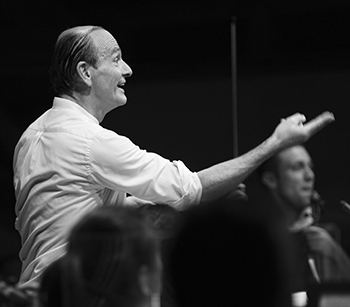
Q&A with Gábor Takács-Nagy
This article first appeared in the Australian National Academy of Music (ANAM) newspaper.
Hungarian musician Gábor Takács-Nagy has had a prolific career as a violinist and a conductor and he is also a highly sought-after chamber music teacher. In November, the Australian National Academy of Music welcomes him to conduct its final 2019 concert in Elisabeth Murdoch Hall. In anticipation of Gábor’s visit, ANAM Librarian Phil Lambert asked him a few questions about the concert program and his career.
Musicians, string players especially, are vulnerable. After years of observing musicians, and dealing with injury yourself, can you advise young players on how to maintain good health and avoid injury? And also, the best way to recover.
I advise young musicians to do some type of sporting activity every day – I myself do 30 minutes of speed walking every morning, it’s great for the mind and the body! If anyone recognises some strange pain or disorder anywhere in their body, I would not wait a single day to look for treatment and advice from a specialist. I unfortunately waited too long before seeking help when I started to have problems with my right hand, and it then became a monstrous problem. To recover from an injury, you need a very, very positive mind which always sees hope and positive outcomes!
Haydn is very central to your work, and he worked for many years for the Esterházy family, spending much time in Fertöd, Hungary. Do you find a Hungarian influence in his music?
It’s difficult to say whether this or that in Haydn’s music is Hungarian (apart from the obvious Hungarian Gypsy motifs, characters and atmospheres in certain pieces). But because he ate our food and drank our wine, heard and saw our folk music dancers, his music is nearer to the earth than Mozart’s – also Hungarians have a special character, very extreme mood changes (sometimes without any transitions) – so this probably helped Haydn to develop the immense contrasts in his music.

You'll be conducting Mozart's Symphony No.25 for us, the first of his two symphonies in G minor. It's a very dramatic work, in the Sturm und Drang style. Can you tell us what Sturm und Drang means for you, and how you approach it?
The Sturm und Drang style in music can be realised immediately, with music expressing extreme emotions – extreme character, dynamics and tempo changes. Being a Hungarian is a bonus for interpreting this kind of music – we are the complete opposite of the English understated-culture. We exaggerate everything! If an English person has a strong headache they’ll say “I feel funny” but a Hungarian will say “I’m dying”. This approach also has to be taken with musical interpretations. You need to feel everything at 150% otherwise you cannot manipulate the listeners with the emotions behind the notes, melodies and harmonies (this is a musician’s number one goal, according to Leopold Mozart in his 1756 textbook, A Treatise on the Fundamental Principles of Violin Playing).
What are some of the things you are looking forward to in Australia?
There are four main things that I am especially looking forward to on my visit to Australia and to ANAM: Firstly, meeting and finding new friends to enrich my life. Secondly, I love working with young people – feeling their energy, openness and freshness makes me feel young again. When interpreting the music of great masters, I strongly feel that we we need to become children again, to embrace a child’s honesty and extreme mood changes. Because young musicians are nearer to childhood – it’s much easier for them to go back to childhood! Thirdly, I’m looking forward to the friendliness and openness of the Australian people! Finally, I’m also very much looking forward to the change in temperature from the European winter to the Australian spring/ summer together with my wife who will be travelling with me.
In your experience, how has the role of a musician (or of music in general) changed across your career? And what advice would you give young musicians at the start of their careers?
During my career I’ve realised a big change, the world is becoming more and more materialistically oriented, the immense progress of the technological world and money is the main focus in people’s lives. So we musicians have a moral obligation to show the spirituality of music because for me, music is a spiritual medicine. Music can change someone’s life and make them a better person. My advice for young people – if you want to be a better musician (if you want to be a brilliant one), love what you do – and you’ll become better. Self-motivation is the key; start every single day wanting to do better than how you did yesterday!
Describe the concert you will be leading at ANAM on Friday 15 November in 5 words.
Magical music of the greats!
Gábor Takács-Nagy directs the ANAM Orchestra in a banquet of music at Melbourne Recital Centre on Friday 15 November 2019. Click here for more information and to buy tickets.
You might also be interested in
-
-
-
Explore the program notes in advance

